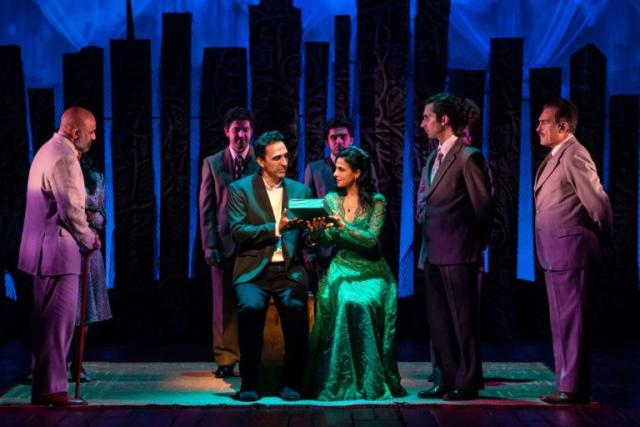

Novels don’t always work well on stage, especially when there’s a first-person narrator. Plays rely on action rather than narration (“Show, don’t tell” is the rule of thumb) and contained plots over sprawling stories. Fortunately, Matthew Spangler’s adaptation of The Kite Runner, Khaled Hosseini’s 2003 best-seller about a young man’s harrowing experiences of growing up in Afghanistan and immigrating to the US after the Russian invasion, is sharply focused, conveying an epic and engaging plot without wandering or diffusing. Now at the Helen Hayes Theater for a limited run after two seasons in London’s West End, Kite runs, soars, and introduces American audiences to a culture rarely, if ever, seen on Broadway.
The scenario borders on the sentimental and the contrived, depending a bit too much on coincidence and deep, dark secrets, but these slight flaws do not hamper Hosseini and Spangler’s powerful theme of redemption over guilt and the triumph of basic decency over geopolitical disasters. There is an overriding narrator, Amir (Amir Arison from TV’s “Blacklist” in an impressive and emotive performance), the son of a wealthy and domineering Afghan businessman. Amir’s relationship with Hassan (heartbreaking Eric Sirakian), the son of the family’s servant, forms the backbone of the play, as class and social barriers force the two boys apart and rupture both lives. The title refers to the sport of kite-flying where the contestants manipulate their aerial toys in attempts to cut rivals’ strings. The runners retrieve the fallen kites to score a victory. Hassan’s talent to fetch the trophies for Amir serves as a metaphor for his loyalty and devotion which Amir later betrays.
We follow Amir to America, as he grows up, marries, achieves success as a writer, and then through a melodramatic twist, returns to his homeland after the Russians have fled and the fanatical Taliban has taken over. Afghanistan’s current chaotic status with the Taliban reasserting its stranglehold following the American withdrawal in 2021 adds to the play’s ironic impact.
As mentioned, Arison carries much of the weight of the narrative on his shoulders, never leaving the stage for the show’s entire two and a half hours. He skillfully portrays Amir’s overwhelming guilt and struggle to make up for his betrayal of Hassan (to explain further would give away too much of the story). In a more conventional plot, the hero would overcome his fear and emerge easily triumphant, but Arison does not cover Amir’s flaws; he displays them with naked frankness. Eric Sirakian pulls at heartstrings unashamedly as the pathetic and noble Hassan.
There is strong support from Faran Tahir and Houshang Touzie as fierce, unforgiving fathers, Azita Ghanizada as Amir’s loving and independent sweetheart, and Amir Malaklou as a childhood bully who becomes a deadly Taliban official.
Giles Croft’s fluid and inventive staging and Charles Balfour’s scene-shifting lighting transport us from Kabul to San Francisco to Pakistan and across decades. Barney George’s multi-purpose environment is effectively transformed into dozens of settings. George’s costumes also establish the various locales and time periods (I especially loved it when the cast leapt out of the wings in 1980s California casual wear to establish Amir’s arrival in the US.) Williams Simpson’s projection design creates an enchanting atmosphere of a kite-filled sky and Jonathan Girling’s original score played by tabla artist Salar Nader is beautifully lush. All these production elements, along with the high-level acting, combine for a fierce and involving evening in the theater. We are taken to a part of the world few in America probably have experienced, which is what theatre is all about or should be.
